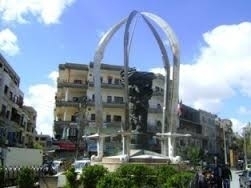As the battle in Eastern Ghouta intensifies, there is more and more speculation that opposition fighters will storm nearby Jaramana.
Some have even concluded that the regime is attempting to lure them there in order to create a rift between the communities in Jaramana, on the southern outskirts of Damascus.
Such hypotheses have been propagated and even appear to be confirmed by the escalation in the number of shells that have hit the city.
They have become almost daily now, especially after the taking of the Tameco checkpoint last month by the armed opposition, renewed again on Sunday after the opposition took control of a number of towns in the Eastern Ghouta region.
In addition to its important geographical location on the road to the international airport and a link between the eastern and western Ghouta, Jaramana is also close to the Southern Highway, which connects quarters of Damascus with Mazzeh, where the security branches and embassies are located.
Moreover, Jaramana has served as a shelter for senior security and military staff and their families, upon whom the regime depends to uphold the cohesion of its institutions. The city is also home to pro-regime militia groups.
The fact that the native population of Jaramana are Druze and Christian makes the city an important pillar of regime support, as the government has long claimed to be the protector of minorities.
The presence of some military units in the city, such as the administration of air defense on its eastern edge, also protects its southern flank.
The city's hospitals are used to treat the wounded fighters and regime militias from Hezbollah and Iraqi Shiites. The city itself is used as a route to downtown Damascus and vice versa, to transfer the logistical support and troops stationed at checkpoints around the city.
All of the above makes the scenario that the regime will willingly give up the city appear unlikely, as from all the aspects, it has an important political and military role in the conflict.
The battle today in the suburbs of Damascus is taking place from neighborhood to neighborhood and from building to building, so it is unlikely such a city with such important attributes would be lost.
As for the talk about using the Druze and Christian regime supporters in the area, the goal has already been achieved.
With shells falling over civilians’ heads and with every new victim (the number of victims of bombings and rocket-propelled grenades in Jaramana stands at over 400) increased congestion, the “undisciplined" factions of the armed opposition are being held responsible.
And, while there are no explicit assurances, the regime exploits the victims of minorities in his favor, to appear by comparison, as the best alternative to what are presented as radical jihadist movements.
All evidence until now points to the idea that the regime will not give up Jaramana. But that does not mean that the armed opposition is not considering storming the city and is simply waiting for the opportunity to change the balance of power in its favor.
Some opposition fighters have alluded to this in previous statements to the media, confirming that it is inevitable sooner or later.
This possibility loomed on several previous occasions, most recently two months ago, after the fall of the Tameco checkpoint. But the armed factions that remain stuck in Eastern Ghouta are aware that storming Jaramana will not be easy.
Such an adventure also has unclear consequences. Unlike Maaloula, Sadad and other Syrian cities, Jaramana has been armed and prepared since the start of the Syrian revolution about 30 months ago. There is no home in Jaramana without firearms, and its Shabbiha militiamen have claimed dozens of victims. It is governed by its inhabitants, especially the Druze who have close family relations extending to other areas.
The fact that Jaramana is not homogenous and hosts various communities also increases the chances of chaos and sectarian massacres.
Adding to that is the fact that the opposition is weak in the city, meaning that all in all, the idea of storming the city becomes a stupid idea which will lead to violence and counter-violence that cannot be predicted.
It is necessary to look for other solutions, such as an agreement on giving up the checkpoints, which are located mostly on the outskirts of the city, at the right moment, without reaching the city center and without confrontation. An arms handover and by Shabbiha involved in criminal actions against neighboring quarters would also help in the stage after the regime is toppled.
These are rational options that would helps all parties to avoid a civil conflict, and that are in the interests of the future of a long-term coexistence and civil peace.
Finally, everyone should remember that Jaramana is governed by its location next to Eastern and Western Ghouta. The regime will leave sooner or later, but the existence of human beings and the realities of their geography and history will remain.
Translated and edited by The Syrian Observer
......


